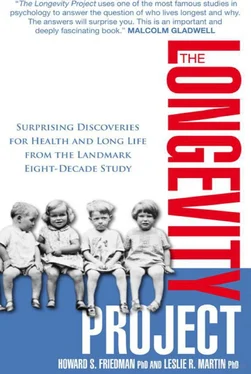But then came a bombshell of an insight: over all the interviews with these older men (almost a quarter of a million words), not a single man ever spoke the word death in reference to his own inevitable demise. A few times they used the word death when mentioning the recent death of a friend, but mostly they talked about their work and their families. Some talked a great deal about their health (and about their own efforts and the efforts of their doctors to maintain their health), but their utterances revealed that they did not focus on death. They talked about their lives, not about their deaths.
Does this mean that the secret to long life is making sure never to talk about death? Not any more than the secret to long life is watching funny TV shows. The ways the long-lived Terman participants thought about and interpreted their lives were part of their healthy patterns, patterns that developed and deepened over many years.
In 1986, when the Terman participants who were still alive were about seventy-five years old, they filled out a questionnaire that included an open-ended question: “What choices would you make differently if you had the opportunity to live life again?” Their answers provide further insight into the thinking of the participants, as they looked back over their lives. Researchers at Cornell University performed one detailed analysis of these answers. 30 30 The Cornell research on the regrets of the Terman participants is in N. Hattaiangadi, V. H. Medvec, and T. Gilovich, “Failing to Act: Regrets of Terman’s Geniuses,” International Journal of Aging and Human Development 40 (1995): 175-85.
Dr. Shneidman’s work had revealed that the discrepancy between what the Terman men aspired to do professionally and what they actually did weighed very heavily on the men who were contemplating (and eventually committed) suicide. Would the Terman participants who lived to old age therefore have few regrets? The septuagenarian Terman participants’ responses in 1986 were coded in terms of whether the regrets—the things they wished they had done differently—were mostly about actions they had taken. Examples of commonly regretted actions were marrying too young, smoking and drinking too much, and focusing too much on career. Or were they okay with what they had done but concerned about actions they had failed to take? Commonly regretted inactions were not completing college or graduate school, not working hard enough in school, not aiming high enough in their career, and not emphasizing social relationships enough.
It turned out that there was a very strong predominance of regretting inactions—opportunities lost—over regretting actions. Rather than thinking about whether they had worked too hard on their careers, they wondered about other careers they might have enjoyed.
In other words, the individuals in this late-life sample of Terman participants were reflecting generally positive thoughts about life. These older men had survived to their midseventies in good enough physical and mental health to be filling out questionnaires. When they looked back over their lives, they didn’t perceive that things had turned out so badly for them—for the most part, as life went on, they didn’t regret what they had done. But they thought that their lives could have been even better if they had taken even further advantage of the opportunities they had confronted.
Conscientiousness and Catastrophizing
By this point in our studies of Karen, Douglas Kelley, Philip, and all the other Terman participants, we knew that conscientiousness was a major factor in long life. But did conscientiousness relate to catastrophizing and the associated early deaths? It did. The conscientious participants were less likely to be the catastrophizers. In fact, even when symptoms of mental illness in early adulthood were held constant, the children who had been more conscientiousness were less likely to commit suicide. 31 31 David Lester did a follow-up study on the Terman suicides, matched controls, and childhood personality; see D. Lester, “Completed Suicide in the Gifted,” Journal of Abnormal Psychology 100 (1991): 604-6.
One reason conscientious individuals live longer is that they cooperate with their medical treatments. Though not surprising, this is important. People who don’t take their pills in the manner that their doctors prescribe them (such as three times a day with food), or who don’t even bother to take their pills at all, are obviously less likely to have a successful medical treatment. In fact, very large numbers of patients—millions in the United States alone—do not cooperate well with their doctors. Sometimes they can’t afford the treatments, and sometimes they find the treatments too uncomfortable to endure. Sometimes they dislike their doctors.
But many such failures to comply are due to personality. Some people simply do not bother to fully understand their treatments or follow directions. Or they believe that they are doomed in any case: after becoming ill, they catastrophize that everything is over. They are unconscientious, imprudent, and unmotivated.
There is a startling twist, however, to the importance of conscientiousness and noncatastrophizing that is not well understood even by most doctors. The pervasive effects of conscientiousness on health go well beyond these cooperation effects (also called adherence effects).
An excellent randomized study conducted a number of years ago at Yale University on medication use after a heart attack well illustrates this point. 32 32 The study on adherence and health outcomes after heart attack is R. I. Horwitz, C. M. Viscoli, L. Berkman, R. M. Donaldson, S. M. Horwitz, C. J. Murray, D. F. Ransohoff, and J. Sindelar, “Treatment Adherence and Risk of Death after a Myocardial Infarction,” Lancet 336, no. 8714 (1990): 542-45.
Patients were given either the medication Propranolol or a placebo sugar pill. The researchers then followed the patients to see who would live long and who would die. What is remarkable about this study is that researchers also evaluated how well each of the participants cooperated with the treatment and took their pills. This was an especially unusual step at the time.
Their first finding was valuable news to cardiologists but not so interesting to us: patients who did not cooperate well with their prescribed treatment—that is, who took less than 75 percent of the prescribed pills—were more than two times more likely to die within a year of follow-up than patients who took all their pills. After all, how could the pills help you if you do not take them?
Most interesting to us, however, was that the conscientious patients (the good adherers) were much more likely to survive whether they were on the Propranolol medication or on the placebo. Being conscientious enough—adherent enough—to fully cooperate with treatment, even if with a placebo, emerged as a more important predictor of mortality risk than the medication itself. Their overall approach to life was what mattered most, not the drug per se.
The conclusion to draw from this and related work is not that one can think positive thoughts and throw away one’s medications. Optimistic, popular Paul (the fun-loving guy who walked on stilts and played pom-pom pull away as a kid) contracted pneumonia in his early forties. He relied on medical expertise and not just his optimistic nature to recover his health. People traveling on healthy pathways have a whole host of healthy thoughts—and associated feelings and behaviors—that combine to produce a dramatic positive influence on their likelihood of long life.
What It Means for You: Guideposts to Health and Long Life
Читать дальше











